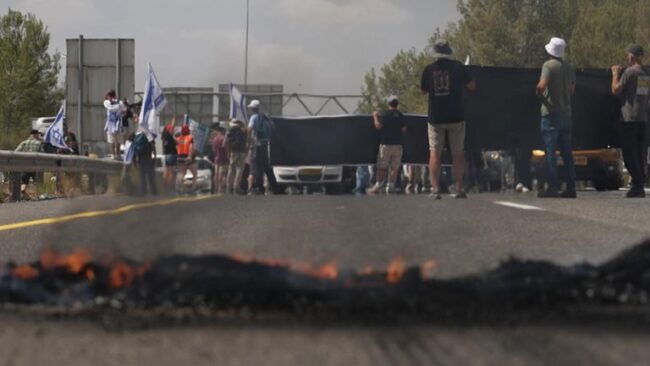The coordinates came through last minute. The instruction was to get there fast.
People organising demonstrations, blocking motorways and major intersections, did not want police getting wind of their plans.
The one we found ourselves at, near the town of Lod, halfway between Tel Aviv and Jerusalem, felt a bit like a flash-mob protest, done and dusted in less than half an hour.
The protestors had set fire to tyres, which blazed across the motorway, filling the sky with thick black smoke.
They waved the Israeli flag and other yellow flags to show solidarity with the remaining hostages still in Gaza, whose photos they carried – their faces and names seared on the collective consciousness now – a collective trauma.
“We want the war to end, we want our hostages back, we want our soldiers back safe home, and we want the humanitarian disaster in Gaza to end”, one of the protestors told me.
“We do not want to have these crimes made in our name.”
And then she was gone, off to the next location as the group vanished in a matter of minutes, leaving police to put out the fire.
This was a day of stoppage, a nationwide strike – a change of tactics by the hostage families to up the ante with the government in their calls to stop the war, make a deal and bring the hostages home.
Benjamin Netanyahu was unmoved.
“Those who are calling for an end to the war today without defeating Hamas are not only hardening Hamas’s stance and delaying the release of our hostages, they are also ensuring that the horrors of October 7 will recur again and again”, he said at the start of the weekly cabinet meeting.
Netanyahu ‘broke contract’ with us
Ahead of the day of strike action, we spoke to a former Air Force reservist who quit in April in protest over Netanyahu’s decision to break the ceasefire.
“I felt he hadn’t broken the contract with Hamas, he’d broken the contract with us – with the people, releasing the hostages, stopping the war. That was my breaking point.”
He wanted to be anonymous, identifying himself by the call sign ‘F’.
He had done three tours since the war began, mostly spent with eyes on Gaza – coordinating air strikes to support ground operations and ensuring the Air Force gets the target right.
‘This is eternal war’
“It’s very complicated, very demanding and very hectic. The main problem is to see that you follow the rules and there are lots of rules – safety rules, international law rules, military doctrine rules.
“And to see that there are no mistakes because you can check all the rules, you can make everything perfect, if there’s a mistake, it bypasses everything you did and the bomb would fall on someone you didn’t want it to fall on.”
I ask him how he feels about the huge death toll in Gaza.
“Look, the uninvolved death toll is tough. It’s tough personally, it’s tough emotionally, it’s tough professionally. It shouldn’t happen.
“When you conduct a war at this scale, it will happen. It will happen because of mistakes, because of the chaos of war.”
He is softly spoken, considered and thoughtful, but says he’s prepared to take part in the more radical protest actions, such as blocking motorways and starting fires, to try and get the message through.
Read more on Sky News:
‘More than 100 killed in a day’
Gaza’s hospitals ‘overwhelmed’
Madonna urges papal intervention
“Hamas is probably the weakest enemy we have had since 1948,” he says.
“In ’48, in the liberation of Israel, we fought seven armies, much better equipped, better ordered than us, and the war took less time.
“We stopped the war with Iran after 12 days. They are much more dangerous than Hamas. We stopped a war with Hezbollah in a couple of months, and they are still a much bigger threat than Hamas.
“You cannot eliminate a terror organisation to the last person. From my point of view, this way – this is eternal war.”






